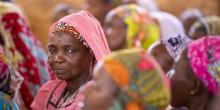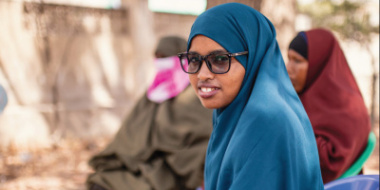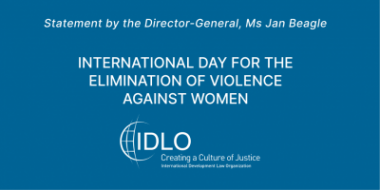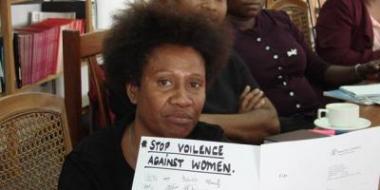Violence and Discrimination

Overall, the law has failed women. Although governments and the international community have invested heavily in legal systems, in many settings, women still suffer appalling violence and discrimination. In some countries, rape is endemic; in others, girls are bought and sold in settlement of family debt; forced and underage marriage, domestic violence and femicide remain all too common. Women's oppression and suffering is compounded by civil conflict. Under the guide of religion or ideology, the desire to control women's bodies or garb persists. For these reasons, IDLO has made gender cross-cutting theme in all its work, as well as the focus of distinct research and programming.
(Photo: ILO/Sarah-Jane Saltmarsh)
Gender-based Violence Survivors at the Core of Justice Programming
ROUNDTABLE PANEL: Gender-based Violence Survivors at the Core of Justice Programming

Honduras: Municipal campaign on support services to fight violence
IDLO and the Municipality of San Pedro Sula in Honduras have launched an awareness campaign on city services available to survivors of gender-based, domestic and intra-familial violence, with information on what constitutes violence, how to avoid it and where to seek help when it happens.

Jóvenes promueven el cambio social en Honduras a través del arte de la fotografía
Languages: English | Español
Young people promote social change in Honduras through photography
Languages: English | Español
Mongolia: Combating domestic violence with civil society and students
On December 6, 2019 IDLO teamed up with the School of Law and Social Sciences of the University of Internal Affairs of Mongolia to organize a prize debating competition where more than 300 students came together to compete in teams presenting arguments around common misconceptions about gender-based violence (GBV).

Empowering communities for improved access to HIV services
In sub-Saharan Africa, adolescent girls and young women aged 15 – 19 years account for 74 percent of new HIV infections.

Myanmar: ‘Stand Together Against Sexual Harassment’
#16Days: Public transport campaign against sexual harassment in Yangon
Every day, some 2.2 million people board buses in Yangon, the commercial capital of Myanmar. They travel across the city to commute to work, visit their families, see a doctor, run errands, go about their day.

“Before the injuries have healed”: Improving justice for Afghan women

Pages
Key Initiatives
-
 Funded by the Delegation of the European Union to Mongolia, the “Child Protection Enhancement Project” (CPEP) builds on the results of its first phase of COVID-19 response programming addressing child access to justice in Mongolia. CPEP works to enhance the child protection system and support Mongolian children by building the technical and professional skills of Legal Committees for Child Rights (LCCRs) through mentorship and advanced training.
Funded by the Delegation of the European Union to Mongolia, the “Child Protection Enhancement Project” (CPEP) builds on the results of its first phase of COVID-19 response programming addressing child access to justice in Mongolia. CPEP works to enhance the child protection system and support Mongolian children by building the technical and professional skills of Legal Committees for Child Rights (LCCRs) through mentorship and advanced training. -
 Following the Tunisian revolution of 2011, the new Constitution adopted in 2014 aimed to embed the principle of equality between women and men as well as ensuring the State’s obligation to protect women’s rights. However, despite the reforms to the legal framework in Tunisia to increase protection for women against gender-based violence, justice sector professionals, particularly judges and bailiffs, have limited knowledge, skills and capacity to act as effective gender justice agents, as stipulated by the new Law.
Following the Tunisian revolution of 2011, the new Constitution adopted in 2014 aimed to embed the principle of equality between women and men as well as ensuring the State’s obligation to protect women’s rights. However, despite the reforms to the legal framework in Tunisia to increase protection for women against gender-based violence, justice sector professionals, particularly judges and bailiffs, have limited knowledge, skills and capacity to act as effective gender justice agents, as stipulated by the new Law. -
 The COVID-19 pandemic and efforts to contain it have had severe and long-lasting impacts on Mongolia. Though prevention and containment measures have successfully prevented a large-scale health crisis, extended lockdowns have negatively affected children’s access to education, psychological and physical wellbeing and reduced the capacity of the Mongolian justice system to respond to crimes against children.
The COVID-19 pandemic and efforts to contain it have had severe and long-lasting impacts on Mongolia. Though prevention and containment measures have successfully prevented a large-scale health crisis, extended lockdowns have negatively affected children’s access to education, psychological and physical wellbeing and reduced the capacity of the Mongolian justice system to respond to crimes against children. -
 Since the revolution in 2011, Tunisia has experienced a period of significant political transition and change culminating in the adoption of a new constitution in 2014, which called for justice reform and protection of women’s rights. However, the practical application of the framework for legal assistance in Tunisia demonstrates the insufficiency of existing relevant mechanisms. Therefore, there is the strong need to empower women to access justice and claim their rights.
Since the revolution in 2011, Tunisia has experienced a period of significant political transition and change culminating in the adoption of a new constitution in 2014, which called for justice reform and protection of women’s rights. However, the practical application of the framework for legal assistance in Tunisia demonstrates the insufficiency of existing relevant mechanisms. Therefore, there is the strong need to empower women to access justice and claim their rights. -
 As a result of the combined military offensive of the Somali National Army and African Union Mission in Somalia with international support, the Al Shabaab extremist group has been significantly degraded and forced into retreat. Al Shabaab’s emergence, and support, particularly among marginalized communities, was and is still to a large extent fueled by both inter and intra-clan conflicts and lack of justice.
As a result of the combined military offensive of the Somali National Army and African Union Mission in Somalia with international support, the Al Shabaab extremist group has been significantly degraded and forced into retreat. Al Shabaab’s emergence, and support, particularly among marginalized communities, was and is still to a large extent fueled by both inter and intra-clan conflicts and lack of justice.
Latest Activity
|
Policy Statements
|




